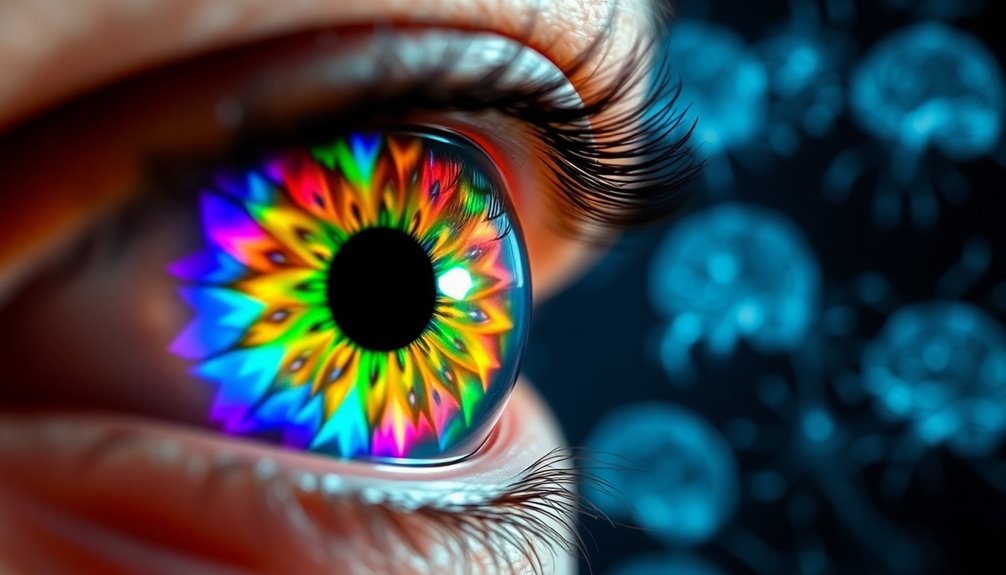Is perception reality? Absolutely! Your perception shapes how you interpret events, often distorting what you see. Two people can witness the same situation but walk away with entirely different views. Emotional states and cognitive biases heavily influence these interpretations. For instance, fear can amplify perceived threats, altering your response to challenges. Engaging in open discussions can help clarify misunderstandings and improve relationships. By fostering self-reflection and emotional intelligence, you can gain better insight into your perceptions. There's so much more to uncover about how perception affects you and the world around you—stay tuned for some revealing insights!
Key Takeaways
- Perception is subjective and varies among individuals, shaped by personal experiences and cultural contexts.
- Cognitive biases, such as confirmation bias, can distort our understanding of reality, favoring information that aligns with our beliefs.
- Emotional states significantly impact how we perceive situations, often amplifying perceived threats and altering our interpretations.
- Open dialogue about differing perceptions can enhance understanding, reduce misunderstandings, and strengthen relationships.
- Engaging with external perspectives helps challenge personal biases, fostering a more accurate view of reality and enriching problem-solving.
Understanding Perception and Reality

In understanding perception and reality, it's crucial to recognize that perception is often shaped by your unique experiences. Your perception of reality can be highly subjective, meaning that two people can interpret the same event in entirely different ways.
Cognitive biases play a considerable role here; for instance, confirmation bias can lead you to favor information that supports your existing beliefs, distorting your view of reality. Neuroscience reveals that your brain actively constructs this perceived reality based on sensory input and prior knowledge, making it a dynamic process. Additionally, understanding cybersecurity vulnerabilities can help illustrate how perceived threats can shape our responses to technology-related risks. Moreover, the use of predictive modeling in educational settings can help reshape perceptions of student performance and potential. Engaging in physical activities can also enhance cognitive development, influencing how we interpret our experiences. Recent advancements in AI, particularly in cybersecurity measures, have further transformed how we perceive and respond to potential threats in our digital environments.
Emotional states also considerably impact how you interpret experiences. For example, if you're feeling anxious, you might perceive a neutral situation as threatening.
Contextual cues further influence your perceptions; the surrounding environment and specific memories can trigger associations that shape your understanding of current events. Furthermore, the impact of automation on business operations illustrates how technological advancements can alter our perceptions of efficiency and productivity in various contexts.
The Influence of Emotions

Emotions play a powerful role in shaping how you perceive the world around you. Your emotional states can distort your perceptions, often amplifying threats when you're afraid and leading you to interpret situations in a skewed manner.
For instance, if you've had negative experiences in the past, those memories can influence your emotional responses, affecting how you react to new challenges. This interplay shows just how deeply emotions impact your reality. Engaging in continuous learning can provide you with new perspectives that help counteract these emotional biases. Additionally, practicing relaxation techniques before sleep can enhance your emotional clarity and improve your overall perception. Individuals with Borderline Personality Disorder often experience intense emotional responses that can significantly distort their perceptions of relationships and situations. Recognizing the signs of burnout recovery is also crucial, as chronic stress can further exacerbate emotional distortions.
The mood congruence effect also highlights this connection. When you're in a certain emotional state, you're more likely to recall memories that match those feelings, reinforcing your current perceptions.
Additionally, the neural pathways activated by your emotions can greatly influence your decision-making processes, altering how you perceive outcomes in various situations. Regular practices of nighttime meditation can help in managing emotional responses and improving mental clarity.
To navigate these complexities, developing emotional intelligence is essential. It allows you to understand and interpret not only your emotions but also those of others.
Brain Science Behind Perception

Your perceptions aren't just shaped by emotions; they're also deeply rooted in brain science. Your nervous system plays an essential role in how you interpret sensory input, constructing a perceived reality that can be vastly different from objective truth. Cognitive biases, like confirmation bias, often distort your interpretations, leading you to favor information that aligns with pre-existing beliefs. This means your trust in your personal perception can be misplaced, even if you're highly intelligent.
The "hard problem of consciousness" highlights the challenge of understanding how subjective experiences arise from brain functions. Current theories struggle to explain this connection thoroughly, leaving gaps in our understanding.
Evolutionarily, your perceptions have been honed by natural selection to prioritize survival rather than accuracy, resulting in cost-effective perception strategies that may misrepresent true reality.
Advances in brain science, particularly collaborations with computer science, are critical for unraveling these complexities. By exploring how your brain processes information, researchers aim to enhance your understanding of perception.
The interplay of these factors reveals that perception isn't just a passive reception of reality but a complex, active construction influenced by myriad elements.
Communication and Misunderstandings

Misunderstanding often stems from the way individuals perceive and interpret messages differently. When you engage in communication, your emotional biases can distort how you perceive things, causing you to interpret intentions in a way that wasn't meant. This can lead to misunderstandings and conflict, as your perception may differ markedly from someone else's objective reality.
One major issue is confirmation bias, where you focus on information that aligns with your existing beliefs, further entrenching misunderstandings. To combat this, it's essential to practice active listening. This means fully engaging with what the other person is saying and asking clarifying questions when needed. By doing so, you foster an environment where open dialogue can thrive, allowing you to address and clarify any misunderstandings.
Engaging in discussions about perceptions not only helps resolve conflicts but also promotes personal growth and strengthens relationships. By acknowledging and respecting differing viewpoints, you can bridge gaps caused by varied perceptions.
Ultimately, improving your communication skills can make a considerable difference in how effectively you connect with others and navigate misunderstandings.
Practical Strategies for Change

Addressing differing perceptions is essential for fostering a healthier communication environment, and practical strategies can drive meaningful change. Start by engaging in open dialogue about your perceptions and those of others. This collaborative approach promotes understanding and helps address misconceptions. In addition, developing cognitive CQ can enhance your ability to understand diverse perspectives and cultural nuances during these discussions. Moreover, incorporating creative storytelling can help convey your ideas more effectively and resonate with others on an emotional level. Recognizing patterns of emotional coldness in relationships can also provide valuable insights into communication breakdowns. Interestingly, studies suggest a correlation between astrological signs and perceived beauty, indicating how perceptions can be influenced by various factors.
Implement regular feedback loops within your team to enable continuous improvement. This way, you can reassess your perceptions based on new information and experiences.
Encourage self-reflection by questioning your established beliefs. This practice enhances self-awareness and boosts your critical thinking skills in decision-making processes. Don't hesitate to seek external perspectives from trusted advisors; they can provide reality checks that help you overcome confirmation bias in your perceptions.
Finally, align your personal and organizational values through symbolic actions. This alignment reinforces your commitment to change and fosters a culture of transparency and trust. Additionally, incorporating digital creativity can enhance collaboration and problem-solving skills within your team, further supporting your efforts for meaningful change.
Frequently Asked Questions
What Is a Famous Quote About Perception and Reality?
A famous quote about perception and reality is by Albert Einstein, who said, "Reality is merely an illusion, albeit a very persistent one."
This highlights how what you perceive may not always align with the objective truth. Your experiences and beliefs shape how you interpret the world around you, reminding you to question your own perceptions.
What Does It Mean When Someone Says Perception Is Reality?
When someone says "perception is reality," they're highlighting that your understanding of the world is shaped by your personal experiences and beliefs.
It means that how you interpret events can differ vastly from objective truths. Your emotions, cognitive biases, and memories all play a role in this interpretation.
Why Is Perception That Reality Is Wrong?
Perception that reality is wrong often stems from cognitive biases and emotional states that distort your understanding.
When you favor information that aligns with your beliefs, you reinforce misconceptions. Your emotions can exaggerate threats or alter your interpretations, leading to a skewed view.
Plus, memory is reconstructive; details can change over time. All these factors influence how you perceive experiences, creating subjective truths that don't accurately reflect the objective reality around you.
What's the Difference Between Perception and Reality?
Perception and reality often clash like a mirage and the desert.
While reality represents the objective truth, measurable and observable, perception embodies your subjective interpretation of that truth. Your brain filters sensory input, shaping how you see the world, sometimes leading to distorted views.
Cognitive biases, like confirmation bias, can further skew your understanding. Recognizing this difference can help you navigate life more effectively, allowing you to question your interpretations and seek a clearer understanding.
Conclusion
In the end, it's clear that perception shapes your reality more than you might realize. As the saying goes, "Seeing is believing," but it's crucial to remember that what you see can be influenced by emotions, experiences, and biases. By understanding these factors, you can change your perceptions and, in turn, your reality. Embrace the power of awareness and open yourself up to new perspectives—your world will transform in ways you never imagined.











